Master
Master Theses at IRIS
Integrating Event-based Vision Capabilities into LLMs

This project explores integrating event-based vision into LLMs through custom layers and knowledge distillation, enabling efficient processing of sparse, asynchronous data for dynamic scene understanding in real-world applications.
Keywords
Event-based vision, large language models, multimodal AI, asynchronous data, sparse representation, high-dynamic range, fast motion, event cameras, knowledge distillation, autonomous navigation, human-robot interaction.
Labels
Semester Project , Master Thesis
Description
Goal
Contact Details
More information
Open this project... call_made
Published since: 2025-09-23
Organization Robotics and Perception
Hosts Zubic Nikola
Topics Mathematical Sciences , Information, Computing and Communication Sciences , Engineering and Technology
Event Representation Learning for Control with Visual Distractors

This project develops event-based representation learning methods for control tasks in environments with visual distractors, leveraging sparse, high-temporal-resolution event data to improve robustness and efficiency over traditional frame-based approaches.
Keywords
Event-based vision, representation learning, control policies, reinforcement learning, visual distractors, high-dynamic range, motion blur, sparse data, robust perception, locomotion, navigation.
Labels
Semester Project , Master Thesis
Description
Goal
Contact Details
More information
Open this project... call_made
Published since: 2025-09-23
Organization Robotics and Perception
Hosts Zubic Nikola
Topics Mathematical Sciences , Information, Computing and Communication Sciences , Engineering and Technology
Electroluminescent Fiber-based Wearable Application

This project aims to develop electroluminescent (EL) fiber-based devices/system for physiological signal detection and/or visualization. By integrating optical emission devices with signal detector modulation, we will create wearable fibers capable of simultaneously sensing health information, paving the way for next-generation smart textiles.
Keywords
Electroluminescent fibers, smart textiles, wearable electronics
Labels
Semester Project , Bachelor Thesis , Master Thesis , ETH Zurich (ETHZ)
Description
Goal
Contact Details
More information
Open this project... call_made
Published since: 2025-09-23 , Earliest start: 2025-09-19
Organization Biomedical and Mobile Health Technology Lab
Hosts Li Yuanlong , Yang Weifeng
Topics Engineering and Technology , Physics
Serial Manufacturing Platform for Magnetic Endovascular Devices

Electromagnetic navigation systems enable steerable endovascular devices to access previously unreachable brain regions for stroke and aneurysm treatment. This project develops a manufacturing setup for scalable production of these devices, followed by fabrication and testing to advance next-generation neurovascular therapies.
Keywords
Mechanical Engineering, Medical Robotics, Mechanical Design
Labels
Semester Project , Master Thesis , ETH Zurich (ETHZ)
PLEASE LOG IN TO SEE DESCRIPTION
More information
Open this project... call_made
Published since: 2025-09-22 , Earliest start: 2025-09-22 , Latest end: 2026-04-01
Organization Multiscale Robotics Lab
Hosts Gantenbein Valentin
Topics Engineering and Technology
Improving Badminton Skills for Competitive Play in Legged Manipulators

We develop learning-based control methods to enable agile and coordinated robot badminton. Building on our recent Science Robotics work, where a quadrupedal manipulator intercepted shuttlecocks at speeds up to 12.06 m/s and played collaboratively with an human, this project aims to advance from collaborative play to competitive gameplay through more effective and strategic returns. The student will work hands-on with our robot, focusing on deploying reinforcement learning policies on hardware, integrating them with high-frequency control loops, and addressing sim-to-real challenges.
Keywords
Learning-based control; Autonomous badminton playing; Sim-to-real transfer
Labels
Master Thesis , ETH Zurich (ETHZ)
Description
Work Packages
Requirements
Contact Details
More information
Open this project... call_made
Published since: 2025-09-17 , Earliest start: 2025-09-30
Organization Robotic Systems Lab
Hosts An Tianxu
Topics Engineering and Technology
Codesign of shape and control: A study in autonomous perching

We aim to co-design a controller and the shape of a glider for a perching maneuver, involving deployment on the real system.
Keywords
optimal control, shape design, global optimization, MPC, reinforcement learning, fluid dynamics, glider, UAV
Labels
Master Thesis
Description
Goal
Contact Details
More information
Open this project... call_made
Published since: 2025-09-16 , Earliest start: 2025-10-01 , Latest end: 2027-03-31
Organization Robotics and Perception
Hosts Reiter Rudolf
Topics Mathematical Sciences , Information, Computing and Communication Sciences , Engineering and Technology
Feasibility of RehabCoach on Adherence to Unsupervised Robot-Assisted Therapy – Implementation and Evaluation of Smart Reminders

Adherence to rehabilitation therapy is essential for the recovery of hand functionality in stroke and traumatic brain injury (TBI) patients. However, maintaining engagement outside clinical settings remains a challenge. This project involves a feasibility study to evaluate the adherence of patients using the RehabCoach app as part of a one-week unsupervised robot-assisted program simulation. The study assesses user engagement, app interaction patterns, and the effectiveness of push notifications/smart reminders in sustaining adherence to the training program. The key components of this research are the development of a smart algorithm for triggering push notifications based on specific user behaviors, such as therapy completion or inactivity, to optimize adherence, as well as conducting the study with a few participants.
Keywords
Stroke, Traumatic Brain Injury, Rehabilitation Therapy, Adherence, Push Notifications, Mobile Health App, Interdisciplinary Research, Python, Django
Labels
Semester Project , Bachelor Thesis , Master Thesis , ETH Zurich (ETHZ)
PLEASE LOG IN TO SEE DESCRIPTION
More information
Open this project... call_made
Published since: 2025-09-16 , Earliest start: 2025-09-21 , Latest end: 2026-03-31
Organization Rehabilitation Engineering Lab
Hosts Retevoi Alexandra
Topics Medical and Health Sciences , Information, Computing and Communication Sciences , Engineering and Technology
Acrobatic Drone Flight Through Moving Gaps with Event Vision

This project develops an end-to-end pipeline for acrobatic drone flight using event-based vision. It leverages the low latency and high dynamic range (HDR) of event cameras to accurately detect and predict the motion of a dynamic narrow gap, maximizing drone maneuverability through a reinforcement learning (RL)-based policy to navigate it successfully.
Labels
Semester Project , Master Thesis
Description
Goal
Contact Details
More information
Open this project... call_made
Published since: 2025-09-12 , Earliest start: 2025-09-12 , Latest end: 2026-12-01
Organization Robotics and Perception
Hosts Ren Yunfan
Topics Engineering and Technology
Learning Precise Force Estimation Under Dynamic Loads

Force estimation on robotic arms is valuable for performing mobile manipulation tasks, such as pick-and-place or playing badminton. However, at high speeds, traditional methods such as momentum-based observers break down due to compounding errors in the dynamic model. Recent works have proposed using LSTMs to apply either a residual to a momentum based observer, or outright replace it with a learned model. However, the problem of doing this at high velocities remains relatively unexplored. In this project, you will develop a data-driven model for estimating forces during dynamic trajectories. You will investigate different model architectures and learning approaches.
Keywords
force estimation, machine learning, robotics
Labels
Semester Project , Master Thesis
PLEASE LOG IN TO SEE DESCRIPTION
More information
Open this project... call_made
Published since: 2025-09-11 , Earliest start: 2025-09-14
Applications limited to ETH Zurich
Organization Robotic Systems Lab
Hosts Fischer Oliver
Topics Engineering and Technology
Vision-Based Agile Aerial Transportation

Develop a vision-based aerial transportation system with reinforcement / imitation learning.
Keywords
aerial transportation, reinforcement learning (RL), drones, robotics
Labels
Master Thesis
Description
Goal
Contact Details
More information
Open this project... call_made
Published since: 2025-09-11 , Earliest start: 2025-05-01 , Latest end: 2026-02-28
Organization Robotics and Perception
Hosts Geles Ismail
Topics Information, Computing and Communication Sciences , Engineering and Technology
Label-Efficient Representation Learning for EEG Time Series

This master`s thesis aims to explore self-supervised learning and transformer-based sequence models to develop label-efficient EEG representations.
Keywords
Deep Learning; Label-efficient Learning; Transformers; Sequence Models
Labels
Master Thesis
Project Background
Your Task
Your Benefits
Your Profile
Contact Details
More information
Open this project... call_made
Published since: 2025-09-06
Organization Sensory-Motor Systems Lab
Hosts Dey Sharmita
Topics Information, Computing and Communication Sciences
Gaussian Splatting Super Resolution

Radiance fields like 3D Gaussian Splatting enable fast, high-fidelity scene reconstruction from real-time data. However, reconstruction quality improves in noticeable stages—e.g., coarse at 500 epochs, detailed at 5000. This project explores whether AI-based upscaling and denoising techniques can be used to predict and accelerate these improvements during training. By anticipating reconstruction quality transitions, we aim to reduce training time while maintaining visual fidelity—advancing the efficiency of radiance field learning.
Keywords
Gaussian Splatting, Computer Vision, Reconstruction
Labels
Master Thesis
PLEASE LOG IN TO SEE DESCRIPTION
More information
Open this project... call_made
Published since: 2025-09-05 , Earliest start: 2025-11-01 , Latest end: 2026-07-31
Applications limited to ETH Zurich
Organization Robotic Systems Lab
Hosts Patil Vaishakh , Wilder-Smith Max
Topics Information, Computing and Communication Sciences
Informed Exploration in Reinforcement Learning via Sampling-Based Planning

Robust locomotion across diverse terrains remains one of the most challenging and exciting problems in legged robotics. While deep reinforcement learning (RL) has enabled impressive quadrupedal behaviors, generalization to unseen or complex terrains often suffers from low sample efficiency. To address this, researchers typically rely on labor-intensive curriculum design, where training terrains are manually structured to progress from easy to difficult, while trying to avoid catastrophic forgetting. These staged curricula allow the RL agent to master simple environments before tackling more complex ones. However, even with such manually designed curricula, RL training can take several days. This is partly because the agent does not retain knowledge about where it has succeeded or failed, nor does it use this experience to inform future exploration. This project aims to develop an automated approach to guide the RL exploration by leveraging sampling-based planning techniques. We formulate the training process as a graph expansion problem, wherein the terrain space is incrementally explored to maximize gains in locomotion robustness and performance. Can the Voronoi bias inherent in sampling-based planning steer the agent toward more effective and sample-efficient training trajectories? If successful, this approach could enable the use of real-world terrain scans for locomotion training, reducing dependence on expert-designed environments and substantially accelerating the training process. The project brings together concepts from sampling-based planning, adaptive curricula, and locomotion learning.
Keywords
Curriculum Learning, Quadruped Locomotion, Sampling-Based Planning, Reinforcement Learning
Labels
Semester Project , Master Thesis
Description
Work Packages
Requirements
Contact Details
More information
Open this project... call_made
Published since: 2025-09-05
Organization Robotic Systems Lab
Hosts Klemm Victor , Qu Kaixian
Topics Information, Computing and Communication Sciences
Event-based Object Segmentation for Vision-Guided Autonomous Systems

This project develops an end-to-end pipeline for object segmentation using event camera data, leveraging their microsecond latency, high dynamic range, and sparse asynchronous output to overcome the limitations of frame-based vision. By combining advanced deep learning architectures with rigorous benchmarking, the approach aims to deliver accurate, temporally consistent, and robust segmentation for real-time applications in navigation and control.
Labels
Semester Project , Master Thesis
Description
Goal
Contact Details
More information
Open this project... call_made
Published since: 2025-09-05 , Earliest start: 2025-09-05 , Latest end: 2026-12-01
Organization Robotics and Perception
Hosts Pellerito Roberto
Topics Engineering and Technology
Novel Learning Paradigms for Low-latency and Efficient Vision

Design and implement efficient event-based networks to achieve low latency inference.
Keywords
Computer Vision, Event Cameras
Labels
Semester Project , Master Thesis
Description
Goal
Contact Details
More information
Open this project... call_made
Published since: 2025-09-05 , Earliest start: 2024-12-12
Organization Robotics and Perception
Hosts Pellerito Roberto , Messikommer Nico
Topics Information, Computing and Communication Sciences
Vision Language Action models for Drones

This project explores generative modeling of drone flight paths conditioned on natural language commands and spatial constraints, aiming to produce plausible 3D trajectories for training reinforcement learning policies. We investigate model architectures, data sources, and trajectory extraction methods to ensure generated paths are both physically feasible and stylistically aligned with textual descriptions.
Labels
Semester Project , Master Thesis
Description
Goal
Contact Details
More information
Open this project... call_made
Published since: 2025-09-05 , Earliest start: 2025-09-05 , Latest end: 2026-12-01
Organization Robotics and Perception
Hosts Pellerito Roberto
Topics Information, Computing and Communication Sciences , Engineering and Technology
Event-Based Tactile Sensor for Humanoid Robotic Hands

Humanoid robots require tactile sensing to achieve robust dexterous manipulation beyond the limits of vision-based perception. This project develops an event-based tactile sensor to provide low-power, high-bandwidth force estimation from material deformation, with the goal of integrating it into a human-scale robotic hand.
Labels
Semester Project , Master Thesis
Description
Goal
Contact Details
More information
Open this project... call_made
Published since: 2025-09-05 , Earliest start: 2026-01-05 , Latest end: 2026-12-01
Organization Robotics and Perception
Hosts Pellerito Roberto
Topics Mathematical Sciences , Information, Computing and Communication Sciences , Engineering and Technology
Neural Vision for Celestial Landings (in collaboration with European Space Agency)

In this project, you will investigate the use of event-based cameras for vision-based landing on celestial bodies such as Mars or the Moon.
Keywords
event-based camera, vision-based navigation
Labels
Master Thesis
Description
Goal
Contact Details
More information
Open this project... call_made
Published since: 2025-09-05 , Earliest start: 2025-09-01 , Latest end: 2026-09-01
Applications limited to University of Zurich , ETH Zurich , EPFL - Ecole Polytechnique Fédérale de Lausanne , Institute of Robotics and Intelligent Systems D-MAVT , IBM Research Zurich Lab , Empa
Organization Robotics and Perception
Hosts Pellerito Roberto
Topics Engineering and Technology
Learning Perception-Aware Navigation Utilizing MPC Layers

In this project, we will use uncertainty-aware localization and an MPC layer within an RL policy to navigate challenging environments.
Keywords
model predictive control, robotics, computer vision, reinforcement learning
Labels
Master Thesis
Description
Goal
Contact Details
More information
Open this project... call_made
Published since: 2025-09-04 , Earliest start: 2025-10-01 , Latest end: 2026-09-30
Organization Robotics and Perception
Hosts Reiter Rudolf
Topics Information, Computing and Communication Sciences , Engineering and Technology
Learning Local Collision Avoidance for Fast and Reactive Navigation in Forests

In modern forestry, selective thinning is used to manage forests more sustainably than traditional clear-cut techniques. Drones can play a key role in this process by providing the foresters with high quality information. But how do we create large scale maps of a forest? As drones have limited battery life, flying fast is key to cover a large area. So how can we make a drone fly fast through the complex forest environment and be reactive to new or previously un-observed obstacles on its way?
Keywords
Robotics, Drones, MAV, Path Planning, Reactive Collision Avoidance, Diffusion, Deep Learning, Machine Learning, Forestry
Labels
Master Thesis , ETH Zurich (ETHZ)
PLEASE LOG IN TO SEE DESCRIPTION
More information
Open this project... call_made
Published since: 2025-09-04 , Earliest start: 2025-09-14
Applications limited to ETH Zurich
Organization Mobile Robotics Lab
Hosts Freissmuth Leonard
Topics Information, Computing and Communication Sciences
Vision-Based World Models for Real-Time Robot Control

This project aims to use vision-based world models as a basis for model-based reinforcement learning, aiming to achieve a generalizable approach for drone navigation.
Keywords
Robotics, Autonomous Systems, Computer Vision, Foundation Models, Reinforcement Learning
Labels
Master Thesis
Description
Goal
Contact Details
More information
Open this project... call_made
Published since: 2025-09-04 , Earliest start: 2025-05-01 , Latest end: 2026-02-28
Organization Robotics and Perception
Hosts Reiter Rudolf
Topics Information, Computing and Communication Sciences
Vision-Based Reinforcement Learning in the Real World

We aim to learn vision-based policies in the real world using embedded optimization layers within reinforcement learning.
Keywords
Robotics, Model Predictive Control, Computer Vision, Reinforcement Learning
Labels
Master Thesis
Description
Goal
Contact Details
More information
Open this project... call_made
Published since: 2025-09-04 , Earliest start: 2025-05-01 , Latest end: 2026-02-01
Organization Robotics and Perception
Hosts Reiter Rudolf
Topics Information, Computing and Communication Sciences , Engineering and Technology
Low-cost Lunar Dust Testing Chamber Development

This hardware-focused thesis will develop a low-cost dust testing chamber for the Lunar Leaper project that is suitable to analyse the dust kickup of different gaits as well as the power loss due to sinkage.
Keywords
moon; lunar; dust; leaper; testing; hardware
Labels
Semester Project , Bachelor Thesis , Master Thesis
Description
Work Packages
Requirements
Contact Details
More information
Open this project... call_made
Published since: 2025-09-02 , Earliest start: 2025-09-16 , Latest end: 2026-02-28
Organization Robotic Systems Lab
Hosts Krasnova Elena , Church Joseph
Topics Engineering and Technology
Real-time control of neural stimulation for stroke patients.

Real-time analysis of movement kinematics can benefit multiple different strategies in rehabilitation after stroke, including allowing closed-loop brain stimulation. Use of inertial measurement units (IMUs) allows detection of movement and extraction of kinematic features, but application in real-time remains challenging. This project will develop algorithms for real-time movement data analysis and feature extraction in typical rehabilitation tasks and general real-life movements. In turn, these algorithms will be applied to control novel brain stimulation approaches in stroke neurorehabilitation.
Keywords
Inertial measurement unit, IMU, movement tracking, machine learning, real-time, signal processing
Labels
Semester Project , Master Thesis
PLEASE LOG IN TO SEE DESCRIPTION
More information
Open this project... call_made
Published since: 2025-09-02 , Earliest start: 2023-05-09
Organization Rehabilitation Engineering Lab
Hosts Viskaitis Paulius , Donegan Dane
Topics Engineering and Technology
Event-Guided 3D Gaussian Splatting for HDR Reconstruction and Relighting

This project investigates how asynchronous event streams can enhance 3D Gaussian Splatting for high dynamic range (HDR) reconstruction and photorealistic relighting. The aim is to achieve faithful scene reconstructions under challenging low-light conditions by fusing event data with sparse or degraded frames.
Keywords
Event cameras, 3D Gaussian Splatting, 3D reconstruction, low-light vision, high dynamic range, event-based vision
Labels
Master Thesis
Description
Goal
Contact Details
More information
Open this project... call_made
Published since: 2025-09-01 , Earliest start: 2025-09-01
Organization Robotics and Perception
Hosts Zou Rong
Topics Information, Computing and Communication Sciences , Engineering and Technology
Self-locking cuff electrodes for the nerve stimulation

Nerve cuff electrodes are designed for reliable recording and stimulation of peripheral nerves, as illustrated in Figure A. This project aims to develop a wireless, self-locking cuff electrode tailored specifically for nerve stimulation, as depicted in Figure B&C.
Keywords
Flexible electrodes design, FEM simulation, Biomedical applications
Labels
Semester Project , Master Thesis
Description
Goal
Contact Details
More information
Open this project... call_made
Published since: 2025-09-01 , Earliest start: 2025-09-01 , Latest end: 2026-09-01
Organization Multiscale Robotics Lab
Hosts Chen Huimin
Topics Engineering and Technology
Reflection and Ghosting Removal with Event Streams

This project explores leveraging event-camera signals to suppress reflections and ghosting in images captured through glass or other reflective surfaces. By exploiting temporal and motion differences between scene content and reflection artifacts, the goal is to disentangle true scene information from distracting overlays.
Keywords
Event cameras, reflection removal, ghosting suppression, image restoration, computational photography, event-based vision
Labels
Semester Project , Master Thesis
Description
Goal
Contact Details
More information
Open this project... call_made
Published since: 2025-09-01 , Earliest start: 2025-09-01
Organization Robotics and Perception
Hosts Zou Rong
Topics Information, Computing and Communication Sciences , Engineering and Technology
Reinforcement Learning for Magnetic Levitation

This project explores the control of freely levitating objects in space using electromagnetic navigation using reinforcement learning. By generating controlled magnetic fields, we can wirelessly manipulate the position and orientation of the levitating magnetic object. A fully functional experimental platform is already available, providing a rich testbed for exploring advanced control strategies.
Keywords
reinforcement learning
Labels
Semester Project , Bachelor Thesis , Master Thesis
Description
Contact Details
More information
Open this project... call_made
Published since: 2025-09-01 , Earliest start: 2025-09-02 , Latest end: 2026-12-31
Organization Multiscale Robotics Lab
Hosts Zughaibi Jasan
Topics Engineering and Technology
Event-based Occlusion Suppression for Robust Detection and VO in Adverse Weather

This project explores the effect of dynamic occlusions on the performance of event-based detection and VO algorithms. It involves the development of low-latency suppression strategies that mitigate such effects, restoring robust perception in adverse weather.
Keywords
Event cameras, occlusion suppression, visual odometry, object detection, adverse weather, event-based vision
Labels
Semester Project , Master Thesis
Description
Goal
Contact Details
More information
Open this project... call_made
Published since: 2025-09-01 , Earliest start: 2025-09-01
Organization Robotics and Perception
Hosts Zou Rong
Topics Information, Computing and Communication Sciences , Engineering and Technology
Meta-model-based-RL for adaptive flight control

This research project aims to develop and evaluate a meta model-based reinforcement learning (RL) framework for addressing variable dynamics in flight control.
Keywords
Model-based Reinforcement Learning, Meta Learning, Drones, Robotics
Labels
Master Thesis
Description
Goal
Contact Details
More information
Open this project... call_made
Published since: 2025-08-31 , Earliest start: 2025-05-01 , Latest end: 2026-04-30
Organization Robotics and Perception
Hosts Geles Ismail
Topics Information, Computing and Communication Sciences , Engineering and Technology
Advancing Vibrotactile Sensory Stimulation for Brain Imaging

Design of comfortable textiles and stimulation protocol for a pneumatic, MRI-compatible vibrotactile stimulator
Keywords
touch sensation, tactile illusions, neurorehabilitation, MRI
Labels
Semester Project , Internship , Master Thesis
Project Background
Your Task
Your Benefits
Your Profile
Contact Details
More information
Open this project... call_made
Published since: 2025-08-28 , Earliest start: 2025-09-15 , Latest end: 2026-06-26
Applications limited to ETH Zurich , EPFL - Ecole Polytechnique Fédérale de Lausanne
Organization Sensory-Motor Systems Lab
Hosts Wolf Peter
Topics Medical and Health Sciences , Engineering and Technology
Spiking Architectures for Advanced Event-Based Temporal Reasoning

This thesis explores novel spiking neural network architectures that leverage event-based vision data and emergent neural synchronization to enable efficient and robust temporal reasoning for dynamic scene understanding and sequential tasks.
Keywords
Spiking Neural Networks (SNNs), Event-Based Vision, Neuromorphic Computing, Temporal Reasoning, Event Cameras, Neural Synchronization, Dynamic Scene Understanding, Gesture Recognition, Robot Navigation, Computational Efficiency, Biological Plausibility
Labels
Master Thesis
Description
Goal
Contact Details
More information
Open this project... call_made
Published since: 2025-08-27
Organization Robotics and Perception
Hosts Zubic Nikola
Topics Mathematical Sciences , Information, Computing and Communication Sciences , Engineering and Technology
Rethinking RNNs for Neuromorphic Computing and Event-based Vision

This thesis develops hardware-optimized recurrent neural network architectures with novel parallelization and kernel-level strategies to efficiently process event-based vision data for real-time neuromorphic and GPU-based applications.
Keywords
Recurrent Neural Networks (RNNs), LSTMs, GRUs, Event-Based Vision, Neuromorphic Computing, Hardware-Aware Optimization, Parallelization, Custom Kernels, GPU Acceleration, Sparse Data Processing, Real-Time Inference, Event Cameras
Labels
Master Thesis
Description
Goal
Contact Details
More information
Open this project... call_made
Published since: 2025-08-27
Organization Robotics and Perception
Hosts Zubic Nikola
Topics Mathematical Sciences , Information, Computing and Communication Sciences , Engineering and Technology
Better Scaling Laws for Neuromorphic Systems
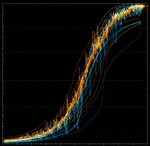
This project explores and extends the novel "deep state-space models" framework by leveraging their transfer function representations.
Keywords
deep learning, state space models, transfer function, parameterizations, S4 model, Fourier Transform, Convolution, Neuromorphic Systems, Neuromorphic, Sequence Modeling, Event-based Vision
Labels
Semester Project , Master Thesis
Description
Goal
Contact Details
More information
Open this project... call_made
Published since: 2025-08-26
Applications limited to University of Zurich , ETH Zurich
Organization Robotics and Perception
Hosts Zubic Nikola
Topics Mathematical Sciences , Information, Computing and Communication Sciences , Engineering and Technology
Reinforcement Learning for Whole-body Robot Manipulation

Reinforcement learning is deployed to make the robot interact with and move large objects. Additionally, sampling-based methods can be used to improve training speed. The scientific selection, evaluation, and comparison of learning methods and control architectures provides valuable insights into advanced robotic manipulation.
Keywords
Robotics, Reinforcement Learning, Manipulation, Humanoid,
Labels
Master Thesis
Description
Work Packages
Requirements
Contact Details
More information
Open this project... call_made
Published since: 2025-08-25 , Earliest start: 2025-09-01 , Latest end: 2026-08-31
Organization Robotic Systems Lab
Hosts Bruedigam Jan
Topics Information, Computing and Communication Sciences , Engineering and Technology
Yell at your robot: Learning navigation with ANYmal

Help advance the next generation of quadrupedal robots by combining Vision-Language-Action (VLA) models with a Forward Dynamics Model for embodiment-aware navigation. You will develop and test a system that predicts safe, physically feasible actions, validated in simulation and real hardware. This is a unique chance to work on cutting-edge embodied AI in collaboration with Stanford’s ASL.
Keywords
Robotic Navigation, Vision-Lanaguage-Action Models, Foundational Models, Forward Dynamics Models, Robot Learning, Machine Learning, Deep Learning
Labels
Master Thesis
Description
Work Packages
Requirements
Contact Details
More information
Open this project... call_made
Published since: 2025-08-21
Applications limited to ETH Zurich , EPFL - Ecole Polytechnique Fédérale de Lausanne , Swiss National Science Foundation , University of Zurich
Organization Robotic Systems Lab
Hosts Roth Pascal , Frey Jonas
Topics Information, Computing and Communication Sciences
Understanding your environment from images for RL-Navigation

Tackle the challenge of learning how quadrupeds understand terrain and risk by training a traversability module grounded in real-world data from ANYmal. The project combines dataset-driven learning with reinforcement learning to build an embodiment-aware navigation system. Work with Stanford’s ASL on a project that blends semantics, dynamics, and robotics.
Keywords
Robot Learning, Reinforcement Learning, Deep Learning, Navigation, Robot Navigation
Labels
Master Thesis
Description
Work Packages
Requirements
Contact Details
More information
Open this project... call_made
Published since: 2025-08-21
Applications limited to ETH Zurich , EPFL - Ecole Polytechnique Fédérale de Lausanne , IBM Research Zurich Lab , Swiss National Science Foundation
Organization Robotic Systems Lab
Hosts Roth Pascal , Frey Jonas
Topics Information, Computing and Communication Sciences
Exploring upper limb impairments using explainable AI on Virtual Peg Insertion Test data

This thesis aims to apply explainable AI techniques to analyze time series data from the Virtual Peg Insertion Test (VPIT), uncovering additional metrics that describe upper limb impairments in neurological subjects, such as those with stroke, Parkinson's disease, and multiple sclerosis. By preserving the full dimensionality of the data, the project will identify new patterns and insights to aid in understanding motor dysfunctions and support rehabilitation.
Keywords
Machine learning, rehabilitation, neurology, upper limb, impairment, explainable AI, SHAP, novel technology, assessment, computer vision, artificial intelligence
Labels
Master Thesis
Description
Goal
Tasks
Your Profile
Contact Details
More information
Open this project... call_made
Published since: 2025-08-21 , Earliest start: 2025-06-01
Organization Rehabilitation Engineering Lab
Hosts Domnik Nadine
Topics Medical and Health Sciences , Information, Computing and Communication Sciences , Engineering and Technology
Comparing the Virtual Peg Insertion Test (VPIT) with the haptic device Inverse3 for assessing upper limb function

This thesis will compare the Virtual Peg Insertion Test (VPIT) with the Inverse3 haptic device by Haply to evaluate its effectiveness as a tool for assessing upper limb function. The focus will be on comparing both the hardware features and software capabilities to determine if the Inverse3 can serve as a valid alternative to VPIT for clinical assessments.
Keywords
Haptic device, virtual environment, rehabilitation, programming, health technology, assessment, software, hardware
Labels
Collaboration , Master Thesis
Description
Goal
Tasks
Your Profile
Contact Details
More information
Open this project... call_made
Published since: 2025-08-21 , Earliest start: 2025-06-01
Organization Rehabilitation Engineering Lab
Hosts Domnik Nadine
Topics Medical and Health Sciences , Information, Computing and Communication Sciences , Engineering and Technology
Mechanophores for advanced wearable strain and pressure sensors

The goal of the project is to synthesize and characterize a number of small molecules capable of acting as mechanophore addition to various polymers. These polymers would then be used as wearable strain or pressure sensors.
Keywords
mechanophore, polymer, wearable, sensor, color, strain, pressure
Labels
Master Thesis
Description
Goal
Contact Details
More information
Open this project... call_made
Published since: 2025-08-19
Organization Biomedical and Mobile Health Technology Lab
Hosts Shokurov Aleksandr
Topics Engineering and Technology , Chemistry
Point-of-Care Sensor for Urinary Iodine

The goal of the project is to develop a cheap and disposable sensor capable of determination of iodine levels in human urine for early diagnostic purposes.
Keywords
electrochemistry, iodine, nutrition, health, point of care
Labels
Master Thesis
Description
Goal
Contact Details
More information
Open this project... call_made
Published since: 2025-08-19
Organization Biomedical and Mobile Health Technology Lab
Hosts Shokurov Aleksandr
Topics Medical and Health Sciences , Engineering and Technology , Chemistry
Intelligent Micromachines Made from Droplet-Based Factory

We invite applications for a Master's thesis / semester project that focuses on the fabrication of microrobots with custom shapes. Using our developed droplet printing technique, this project will explore how different microrobot shapes, created by different magnetic fields and materials, influence their control behaviors in blood vessels. This research aims to advance biomedical technologies, particularly in targeted drug delivery and minimally invasive procedures.
Keywords
Microrobotics, 4D Printing, Soft Materials, Biomedical Devices
Labels
Semester Project , Master Thesis , Student Assistant / HiWi , ETH Zurich (ETHZ)
Description
Goal
Contact Details
More information
Open this project... call_made
Published since: 2025-08-18 , Earliest start: 2025-06-02
Organization Multiscale Robotics Lab
Hosts Hu Minghan
Topics Engineering and Technology , Chemistry
Multi-view 3D dynamic scene reconstruction with robustness against self-occlusion

Reconstructing 3D geometry from videos of dynamic scenes is challenging due to complex camera motion, multiple moving objects, and frequent self-occlusions. This project extends the CUT3R framework to a multi-view, stateful recurrent model that integrates observations from a robot’s six synchronized cameras. By leveraging known camera parameters, the system maintains and updates a robust scene representation over time, enabling accurate reconstruction despite occlusions and dynamic changes. The learned representation will be evaluated both for reconstruction quality and as input to downstream robotic tasks, such as collision-aware reaching in cluttered, dynamic environments.
Keywords
3D dynamic scene reconstruction, multi-view geometry, scene representation learning, stateful recurrent models, structure from motion
Labels
Master Thesis
Description
Work Packages
Requirements
Contact Details
More information
Open this project... call_made
Published since: 2025-08-14 , Earliest start: 2025-08-13 , Latest end: 2026-09-13
Organization Robotic Systems Lab
Hosts Barath Daniel , Zurbrügg René , Portela Tifanny
Topics Information, Computing and Communication Sciences
Kinematics and Dynamics of Human-Like Locomotion in LocoMuJoCo Simulations

This Master’s thesis at ETH Zürich focuses on benchmarking and improving humanoid locomotion policies in the LocoMuJoCo simulation environment. The project develops a complete pipeline for analyzing kinematic and dynamic metrics, enabling direct comparison of simulated humanoid locomotion with real-world human motion capture data.
Keywords
Humanoid Locomotion, MuJoCo, Motion Analysis, Deep Reinforcement Learning, Simulation
Labels
Internship , Master Thesis , ETH Zurich (ETHZ)
Project Background
Your Task
Your Benefits
Your Profile
Contact Details
More information
Open this project... call_made
Published since: 2025-08-12 , Earliest start: 2025-09-01
Organization Sensory-Motor Systems Lab
Hosts Paez Diego, Dr.
Topics Medical and Health Sciences , Mathematical Sciences , Information, Computing and Communication Sciences , Engineering and Technology
Foundation models for generalizable construction machine automation

Autonomous operation of heavy construction machinery promises major gains in safety, efficiency, and scalability for the multi-trillion-dollar construction industry. Excavators present a unique challenge, combining the navigation demands of autonomous driving with the precision of robotic manipulation in unstructured, dynamic environments. This project explores Vision-Language-Action (VLA) and diffusion-based policy learning to develop generalizable excavation policies. Leveraging large-scale demonstration data naturally collected during human operation, we aim to train multimodal control models capable of adapting across sites, lighting conditions, and machine types. The approach will be evaluated through simulation benchmarks and, if possible, real-world trials, advancing the path toward scalable, generalist autonomy for robotic construction.
Labels
Semester Project , Master Thesis
PLEASE LOG IN TO SEE DESCRIPTION
More information
Open this project... call_made
Published since: 2025-08-12 , Earliest start: 2025-08-31 , Latest end: 2026-03-31
Applications limited to ETH Zurich , EPFL - Ecole Polytechnique Fédérale de Lausanne
Organization Robotic Systems Lab
Hosts Nan Fang , Zhang Weixuan
Topics Engineering and Technology
Collision Avoidance - Master Thesis at Avientus

Avientus is a startup that specializes in developing cutting-edge, heavy-duty automated drone transportation systems designed to revolutionize logistics and industrial applications. To further enhance the safety and reliability of their drones, we are offering a Master Thesis opportunity in the field of collision avoidance for drones.
Keywords
Collision avoidance, Computer vision, Drones
Labels
Master Thesis
Description
Requirements
Contact Details
More information
Open this project... call_made
Published since: 2025-08-12 , Earliest start: 2025-08-01 , Latest end: 2026-02-28
Applications limited to ETH Zurich
Organization Autonomous Systems Lab
Hosts Mascaro Rubén , Chli Margarita
Topics Information, Computing and Communication Sciences
From Human Videos to Robot Control: Correcting the Embodiment Gap for Dexterous Manipulation

Several strategies tackle the embodiment gap between human demonstrations and robot execution. Some remove human or robot hands from videos via segmentation and inpainting to produce agent‑agnostic inputs or uniform end-effector cues, while others replace human hands with rendered robot manipulators to synthesize robot views. Latent space alignment methods enforce a shared embedding for human and robot observations, and recent cross‑embodiment techniques inpaint source robot embodiments into target frames during testing to maintain visual consistency across domains. In this project, we aim to systematically compare these embodiment gap-bridging methods under a unified evaluation protocol. Unlike prior work that typically focuses on one technique in isolation, we implement and benchmark multiple approaches on a real robotic platform equipped with a dexterous five-fingered hand.
Keywords
egocentric vision, representation learning, robotic manipulation
Labels
Master Thesis
Description
Contact Details
More information
Open this project... call_made
Published since: 2025-08-11 , Earliest start: 2025-10-01 , Latest end: 2026-05-01
Organization Computer Vision and Geometry Group
Hosts Gavryushin Alexey , Portela Tifanny , Zurbrügg René
Topics Information, Computing and Communication Sciences
Wearable device for non-invasive assessment of fatigue

The goal of the project is to develop a wearable device capable of non-invasive measurement of human biomarkers related to performance and fatigue during exercise.
Keywords
wearable, fatigue, exercise, sensor, athlete, non-invasive, sport
Labels
Master Thesis
Description
Goal
Contact Details
More information
Open this project... call_made
Published since: 2025-08-11
Organization Biomedical and Mobile Health Technology Lab
Hosts Shokurov Aleksandr
Topics Medical and Health Sciences , Engineering and Technology , Chemistry
ADHD-Biomarker Study: Software development of Data Collection and Data Management Structures

The Rehabilitation Engineering Laboratory (ReLab), ETH Zurich is running a paediatric study that integrates fNIRS, EEG, eye-tracking and motion sensing to establish objective biomarkers for Attention-Deficit/Hyperactivity Disorder (ADHD). You will create the technical backbone of a multimodal data-collection setup – coding computerized attention tests, synchronizing hardware, and delivering clean, well-documented datasets for downstream research.
Keywords
ADHD, Biomarker, fNIRS, EEG, Eye-tracking, Motion sensing, Data collection, Data management, Software engineering
Labels
Semester Project , Course Project , Internship , Lab Practice , Bachelor Thesis , Master Thesis , ETH Zurich (ETHZ)
Description
Goal
Tasks
Your Profile
Contact Details
More information
Open this project... call_made
Published since: 2025-08-08 , Earliest start: 2025-08-10 , Latest end: 2026-03-31
Organization Rehabilitation Engineering Lab
Hosts Schönhammer Josef
Topics Medical and Health Sciences , Engineering and Technology , Behavioural and Cognitive Sciences
ADHD-Biomarker Study: Neuropsychological Task Development and Data Analytics

The Rehabilitation Engineering Laboratory (ReLab), ETH Zurich is running a pediatric study that integrates fNIRS, EEG, eye-tracking and motion sensing to establish objective biomarkers for Attention-Deficit/Hyperactivity Disorder (ADHD). You will drive the scientific backbone of the project – optimizing child-specific task parameters, leading participant interaction, and conducting and presenting statistical analyses.
Keywords
ADHD, Biomarkers, Neuropsychology, fNIRS, EEG, Eye-tracking, Motion Capture, Data Analytics, Statistical Analysis
Labels
Semester Project , Course Project , Internship , Lab Practice , Bachelor Thesis , Master Thesis , ETH Zurich (ETHZ)
Description
Goal
Tasks
Your Profile
Contact Details
More information
Open this project... call_made
Published since: 2025-08-08 , Earliest start: 2025-08-10 , Latest end: 2026-03-31
Organization Rehabilitation Engineering Lab
Hosts Schönhammer Josef
Topics Medical and Health Sciences , Engineering and Technology , Behavioural and Cognitive Sciences
Learning-based Control for Magnetic Levitation
This project explores the control of freely levitating objects in space using electromagnetic navigation, as illustrated in the image above. By generating controlled magnetic fields, we can wirelessly manipulate the position and orientation of the levitating magnetic object. A fully functional experimental platform is already available, providing a rich testbed for exploring advanced control strategies.
Keywords
magnetic levitation control, learning-based control, Model Predictive Control
Labels
Semester Project , Bachelor Thesis , Master Thesis
Description
Contact Details
More information
Open this project... call_made
Published since: 2025-08-06 , Earliest start: 2025-08-07 , Latest end: 2026-12-31
Organization Multiscale Robotics Lab
Hosts Zughaibi Jasan
Topics Engineering and Technology
Revolutionizing Medicine with Magnetoelectric Nanorobots: Toward Wireless and Minimally Invasive Therapies

Magnetoelectric nanorobots, assembled from core–shell nanoparticles that integrate a magnetic core and a piezoelectric shell, enable wireless actuation by transducing magnetic fields into localized electric responses. Through controlled synthesis and functional design, these nanosystems can be endowed with navigation, responsiveness, and biocompatibility, paving the way for advanced applications in remote biomedical stimulation, targeted drug delivery, and intelligent therapeutic platforms.
Keywords
Nanorobot, Microrobot, Magnetoelectric Nanoparticles, Core-Shell Synthesis, Cobalt Ferrite, Barium Titanate, Targeted Drug Delivery, Cancer Treatment
Labels
Semester Project , Bachelor Thesis , Master Thesis
Description
Contact Details
More information
Open this project... call_made
Published since: 2025-08-04 , Earliest start: 2025-09-15
Applications limited to ETH Zurich
Organization Multiscale Robotics Lab
Hosts Vezzoni Alessia
Topics Engineering and Technology , Chemistry , Biology
Leveraging Long Sequence Modeling for Drone Racing
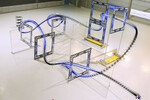
Study the application of Long Sequence Modeling techniques within Reinforcement Learning (RL) to improve autonomous drone racing capabilities.
Keywords
long sequence modeling, state-space models, convolutional neural networks, CNNs, recurrent neural networks, RNNs, sequence dynamics, dynamical systems, reinforcement learning, RL, optimal control, drone racing, machine learning, autonomous navigation
Labels
Master Thesis
Description
Goal
Contact Details
More information
Open this project... call_made
Published since: 2025-08-04
Applications limited to ETH Zurich , University of Zurich
Organization Robotics and Perception
Hosts Zubic Nikola
Topics Information, Computing and Communication Sciences , Engineering and Technology
Neural Architecture Knowledge Transfer for Event-based Vision

Perform knowledge distillation from Transformers to more energy-efficient neural network architectures for Event-based Vision.
Keywords
deep neural networks, knowledge transfer, knowledge distillation, event cameras, event-based vision, sequence modeling, transformers, low-energy vision
Labels
Master Thesis
Description
Goal
Contact Details
More information
Open this project... call_made
Published since: 2025-08-04
Applications limited to ETH Zurich , University of Zurich
Organization Robotics and Perception
Hosts Zubic Nikola
Topics Information, Computing and Communication Sciences , Engineering and Technology
Mechanistic Evaluation of taVNS in Motor Adaptation for Stroke Rehabilitation

This study aims to evaluate the mechanisms by which transauricular vagus nerve stimulation (taVNS) may facilitate motor learning and adaptation, focusing on reticulospinal tract (RST) activation. A set of assessments will be used to build a comprehensive neurophysiological profile, providing insights relevant to developing taVNS-based clinical interventions. In this role, you will engage in study design, data collection, and analysis, gaining hands-on experience in mechanistic neurophysiological research with direct clinical applications.
Keywords
Transauricular vagus nerve stimulation (taVNS) Reticulospinal tract (RST) Motor learning StartReact paradigm Stroke rehabilitation Neurophysiology Multisite EMG Motor pathway activation Clinical neurostimulation
Labels
Semester Project , Internship , Bachelor Thesis , Master Thesis
PLEASE LOG IN TO SEE DESCRIPTION
More information
Open this project... call_made
Published since: 2025-08-04 , Earliest start: 2024-11-24 , Latest end: 2025-10-26
Organization Rehabilitation Engineering Lab
Hosts Viskaitis Paulius
Topics Medical and Health Sciences , Engineering and Technology
Scene graphs for robot navigation and reasoning

Elevate semantic scene graphs to a new level and perform semantically-guided navigation and interaction with real robots at The AI Institute.
Keywords
Scene graphs, SLAM, Navigation, Spacial Reasoning, 3D reconstruction, Semantics
Labels
Master Thesis , ETH Zurich (ETHZ)
Description
Work Packages
Requirements
Contact Details
More information
Open this project... call_made
Published since: 2025-08-04 , Earliest start: 2025-01-15 , Latest end: 2025-10-31
Organization Robotic Systems Lab
Hosts Gawel Abel , Kneip Laurent
Topics Information, Computing and Communication Sciences , Engineering and Technology
Master Thesis – Data Platforms & Kinematic Biomarkers in Neurorehabilitation

Join Skaaltec, an ETH Zürich spin-off project hosted at RELab, and help build digital infrastructure for our SmartVNS stroke rehabilitation system. This thesis offers an opportunity to work in a research project with a direct pathway to translate into clinical application.
Keywords
neurorehabilitation, kinematic analysis, clinical evaluation, neurotechnology, biomarker discovery, biomedical signal processing, time-series data processing, data processing pipelines, data modeling, full-stack development, cloud services, containerization, database management, IMU data, UI/UX, Python, Django, React
Labels
Semester Project , Internship , Bachelor Thesis , Master Thesis
Description
Goal
Tasks
Your Profile
Contact Details
More information
Open this project... call_made
Published since: 2025-07-31 , Earliest start: 2025-08-01 , Latest end: 2026-05-31
Organization Rehabilitation Engineering Lab
Hosts Roady Alen , Viskaitis Paulius
Topics Medical and Health Sciences , Information, Computing and Communication Sciences , Engineering and Technology
Internship – Scalable Data Processing for a Wearable Stroke Rehab System

Join Skaaltec, an ETH Zürich spin-off project hosted at RELab, and help build digital infrastructure for our SmartVNS stroke rehabilitation system. This internship offers an opportunity to work on bridging the gap from academic research to clinical application.
Keywords
neurotechnology, time-series data processing, data modeling, full-stack development, cloud services, containerization, database management, web technologies, CI/CD, IMU data, IoT, UI/UX, Raspberry Pi, Electron Python, Django, React, Astro, Decap CMS, BLE
Labels
Semester Project , Internship , Bachelor Thesis , Master Thesis
Description
Goal
Tasks
Your Profile
Contact Details
More information
Open this project... call_made
Published since: 2025-07-31 , Earliest start: 2025-08-01 , Latest end: 2026-05-31
Organization Rehabilitation Engineering Lab
Hosts Viskaitis Paulius , Roady Alen
Topics Information, Computing and Communication Sciences , Engineering and Technology
Reiforcement Learning of Pretrained Trasformer Models

We want to train RL agents on our new particle simulator, accelerated on the GPU via warp in Isaac sim.
Keywords
Keywords: particle simulation, omniverse, warp, reinforcement learning
Labels
Semester Project , Master Thesis
Description
Work Packages
Requirements
Contact Details
More information
Open this project... call_made
Published since: 2025-07-29 , Earliest start: 2025-09-01 , Latest end: 2026-03-31
Organization Robotic Systems Lab
Hosts Terenzi Lorenzo
Topics Information, Computing and Communication Sciences
Multiagent Reinforcement Learning in Terra

We want to train multiple agents in the Terra environment, a fully end-to-end GPU-accelerated environment for RL training.
Keywords
multiagent reinforcement learning, jax, deep learning, planning
Labels
Semester Project , Master Thesis
Description
Work Packages
Requirements
Contact Details
More information
Open this project... call_made
Published since: 2025-07-29 , Earliest start: 2025-09-01 , Latest end: 2026-03-31
Organization Robotic Systems Lab
Hosts Terenzi Lorenzo
Topics Information, Computing and Communication Sciences
Firmware and Readout System for Joint and Tactile Sensing in Robotic Hands Using SoC Microcontrollers

The student will develop firmware for a system-on-chip (SoC) microcontroller to enable efficient readout of serialized sensor data in tendon-driven robotic hands. Tasks include analyzing existing readout methods, evaluating SoC architectures, implementing optimized firmware, and validating the system on development boards. Depending on the project scope, the student may also design a compact hardware platform integrating the chosen SoC and supporting components for a complete prototype.
Keywords
Embedded systems, Sensor integration, Robotic hands, Microcontroller, Data acquisition
Labels
Semester Project , Bachelor Thesis , Master Thesis
PLEASE LOG IN TO SEE DESCRIPTION
More information
Open this project... call_made
Published since: 2025-07-28 , Earliest start: 2025-08-01
Organization Soft Robotics Lab
Hosts Kim Jaehoon
Topics Engineering and Technology
Bimanual Dexterity: Coordinated Dual-Arm Policies for Dexterous Object Manipulation

Dexterous bimanual manipulation remains a difficult challenge, requiring tight coordination between both arms and hands—especially when handling large objects. While humans perform such tasks effortlessly, robotic systems often lack the precision and adaptability needed. This project aims to tackle this problem by learning coordinated dual-arm and hand policies from a few human demonstrations, followed by reinforcement learning in simulation for real-world deployment.
Keywords
Dexterous Manipulation, Bimanual Manipulation, Learning from Demonstrations, Reinforcement Learning, Humanoid Robotics
Labels
Semester Project , Master Thesis
Description
Work Packages
Requirements
Contact Details
More information
Open this project... call_made
Published since: 2025-07-25 , Earliest start: 2025-07-28 , Latest end: 2026-05-31
Organization Robotic Systems Lab
Hosts He Junzhe , Mittal Mayank , Bhardwaj Arjun
Topics Information, Computing and Communication Sciences
From Grasp to Twist: Composing Dexterous Grasping and In-Hand Manipulation under Motion

Dexterous in-hand manipulation has advanced rapidly, yet most approaches assume the object is already grasped or the hand is fixed in place—conditions rarely met in real-world scenarios. This project addresses the challenge of enabling robots to both grasp and manipulate objects dynamically by learning modular skills that can be coordinated for effective manipulation under motion.
Keywords
Dexterous Manipulation, Reinforcement Learning, Skill Learning
Labels
Semester Project , Master Thesis
Description
Work Packages
Requirements
Contact Details
More information
Open this project... call_made
Published since: 2025-07-25 , Earliest start: 2025-07-28 , Latest end: 2026-05-31
Organization Robotic Systems Lab
Hosts Bhardwaj Arjun , Zurbrügg René , Mittal Mayank
Topics Information, Computing and Communication Sciences
3D Pose Estimation to Understand Orthosis Effects in Cerebral Palsy

This Master’s thesis at ETH Zürich develops a 3D pose estimation pipeline to evaluate the effects of orthotic devices on gait patterns in children with cerebral palsy (CP). Using a CP-specific dataset, the project benchmarks multiple 2D and 3D pose estimation models, fine-tunes the best-performing model, and applies time-series analysis to assess joint-level kinematic differences across healthy, CP without orthosis, and CP with orthosis conditions. The goal is to support clinical assessment through non-invasive motion analysis.
Keywords
3D Pose Estimation, Cerebral Palsy, Gait Analysis, Orthosis, Deep Learning
Labels
Internship , Master Thesis , ETH Zurich (ETHZ)
Description
Goal
Contact Details
More information
Open this project... call_made
Published since: 2025-07-23 , Earliest start: 2025-07-23 , Latest end: 2025-09-30
Organization Spinal Cord Injury & Artificial Intelligence Lab
Hosts Paez Diego, Dr. , Paez Diego, Dr.
Topics Medical and Health Sciences , Information, Computing and Communication Sciences
Dynamic actuation for improved endoluminal navigation of magnetic continuum robots

We want to explore the use of dynamically changing magnetic fields to improve the navigation of magnetically actuated catheters and guidewires for endoluminal procedures. This project aims to build catheter prototypes and an experimental setup to evaluate this concept in vitro using anatomical models and state-of-the-art electromagnetic navigation systems.
Keywords
Mechatronics, Hardware Design, Programming
Labels
Master Thesis
PLEASE LOG IN TO SEE DESCRIPTION
More information
Open this project... call_made
Published since: 2025-07-22 , Earliest start: 2025-09-01
Applications limited to ETH Zurich
Organization Multiscale Robotics Lab
Hosts Boehler Quentin , Mesot Alexandre
Topics Engineering and Technology
Underwater Depth Estimation from RGB and Sonar with Spatio-Temporal Consistency

Are you excited about applying machine learning to real-world robotics challenges? This thesis offers the opportunity to develop a novel depth estimation framework that fuses RGB camera and sonar data for robust underwater perception—crucial in environments where traditional sensors fail. You'll work with real data collected from a Tethys ONE robot and enhance your model with spatio-temporal consistency to boost performance over time. If you're motivated by impactful research, hands-on experimentation, and pushing the boundaries of perception in low-visibility conditions, we’d love to hear from you.
Keywords
robotics, underwater, computer vision, learning, rgb, sonar, depth estimation
Labels
Master Thesis
Description
Work Packages
Requirements
Contact Details
More information
Open this project... call_made
Published since: 2025-07-22
Organization Autonomous Systems Lab
Hosts Oleynikova Helen, Dr.
Topics Information, Computing and Communication Sciences , Engineering and Technology
Efficient data processing and reporting in stroke neuro-rehabilitation

Project goal is to optimise existing and develop new algorithms into an efficient system for signal pre-processing, data storage, analysis and visualization in motor-neurorehabilitation. This data is generated by stroke patients wearing motion sensors during their therapy sessions. Key endpoint of the project is to display real-time and longitudinal therapy results, which can aid therapists and patients. The results of the project will help develop a more efficient therapy and is a key part of a larger project that seeks to develop an intelligent and closed-loop neural stimulation system for stroke rehabilitation.
Keywords
health biomarkers, data science, computer science, data visualization, data processing, real-time, internet of medical things, IoMT, healthcare internet of things, healthcare IoT
Labels
Semester Project , Internship , Master Thesis
PLEASE LOG IN TO SEE DESCRIPTION
More information
Open this project... call_made
Published since: 2025-07-22 , Earliest start: 2023-05-09
Organization Rehabilitation Engineering Lab
Hosts Donegan Dane , Viskaitis Paulius
Topics Medical and Health Sciences , Information, Computing and Communication Sciences , Engineering and Technology
Development of flexible, biocompatible electrodes for vagus nerve stimulation therapy

Stroke is the most common cause of disability and as many as 14 million people suffer a stroke every year. Typical therapy today is focused on physical exercises and rarely combats the core of the problem - the interactions between the motor actions and the activity patterns of the injured brain. Therefore, we are developing a cutting-edge medical device that helps combine physical therapy with a non-invasive brain stimulation. This is expected to boost recovery after stroke and make this advanced neuro-therapy accessible to millions of people who need it.
Keywords
Biocompatibility Conductive Materials Vagus Nerve Stimulation (VNS) Transcutaneous VNS (tVNS) Stroke Rehabilitation Therapy Medical Device Engineering Electrode Design and Prototyping Materials Science Biomedical Engineering Neurorehabilitation Clinical Usability Patient-Centred Design
Labels
Semester Project , Bachelor Thesis , Master Thesis
PLEASE LOG IN TO SEE DESCRIPTION
More information
Open this project... call_made
Published since: 2025-07-22 , Earliest start: 2024-11-24 , Latest end: 2025-10-31
Organization Rehabilitation Engineering Lab
Hosts Viskaitis Paulius
Topics Medical and Health Sciences , Engineering and Technology
Better View Learning Using RL

Selecting the right viewpoint is crucial for effective perception and task execution in robotics and autonomous systems. Traditional rule-based methods often struggle in complex or dynamic settings. This project explores reinforcement learning (RL) to enable agents to autonomously learn adaptive viewpoint selection strategies. By maximizing task performance and information gain, the resulting policies aim to enhance system efficiency in applications such as active perception, autonomous exploration, and intelligent robotic control.
Keywords
Active Perception, Optimal Viewpoint Learning, Reinforcement Learning, Robotic Manipulation
Labels
Semester Project , Master Thesis
PLEASE LOG IN TO SEE DESCRIPTION
More information
Open this project... call_made
Published since: 2025-07-21 , Earliest start: 2025-07-28 , Latest end: 2026-04-30
Organization Robotic Systems Lab
Hosts Zurbrügg René , Bhardwaj Arjun
Topics Information, Computing and Communication Sciences , Engineering and Technology
Embedded algorithms of IMUs in a neurorehabilitation device

The goal of this project is to help develop embedded firmware for a imu based rehabilitation device. This project is part of the SmartVNS project which utilizes movement-gated control of vagus nerve stimulation for stroke rehabilitation.
Keywords
electrical engineering PCB Embedded systems neurorehabilitation
Labels
Semester Project , Master Thesis
PLEASE LOG IN TO SEE DESCRIPTION
More information
Open this project... call_made
Published since: 2025-07-17 , Earliest start: 2024-01-06 , Latest end: 2024-12-31
Organization Rehabilitation Engineering Lab
Hosts Donegan Dane , Viskaitis Paulius
Topics Medical and Health Sciences , Engineering and Technology
Machine Learning Based Estimation of Blood Pressure from wearable sensors

This project explores the development and validation of an AI based system for non-invasive blood pressure estimation. The method focuses on deriving pulse transit time (PTT) using dual A-mode piezoelectric sensors (ultrasound) and characterizing vascular features such as arterial wall diameter and flow velocity. The work contributes toward a future wearable ultrasound-based solution for continuous cardiovascular monitoring.
Keywords
machine learning, deep learning, artificial intelligence, blood pressure, pulse transit time, vascular imaging, Doppler, heart rate, anxiety
Labels
Semester Project , Internship , Master Thesis
Description
Goal
Contact Details
More information
Open this project... call_made
Published since: 2025-07-17 , Earliest start: 2025-09-01 , Latest end: 2026-09-01
Organization Biomedical and Mobile Health Technology Lab
Hosts Otesteanu Corin, Dr
Topics Medical and Health Sciences , Information, Computing and Communication Sciences , Engineering and Technology
Development and Testing of Electrical Systems for a SmartVNS Docking Station with Focus on Wireless Data Management

We are looking for an enthusiastic electrical/firmware engineer to design and implement the electrical and firmware aspects of a docking station for the SmartVNS device. The station will charge the device components (pulse generator and wrist motion tracker) and pull data from the pulse generator and motion tracker, uploading it to an online server via Wi-Fi. This project will also involve testing the reliability of data transfer and power systems under real-world conditions, providing valuable insights into the practical application of this technology.
Keywords
Electrical, embedded, electronic, engineering, biomedical
Labels
Internship , Bachelor Thesis , Master Thesis
PLEASE LOG IN TO SEE DESCRIPTION
More information
Open this project... call_made
Published since: 2025-07-17 , Earliest start: 2024-08-18 , Latest end: 2025-10-01
Organization Rehabilitation Engineering Lab
Hosts Viskaitis Paulius
Topics Information, Computing and Communication Sciences , Engineering and Technology
Master Thesis: Development of a Customized Knee Orthosis for Osteoarthritis
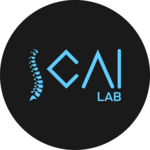
Osteoarthritis (OA) presents a significant challenge in healthcare, necessitating innovative solutions to alleviate pain, enhance mobility. This thesis documents the research and development journey of an OA knee orthosis within the Spinal Cord and Artificial Intelligence Lab (SCAI-Lab) at ETH Zurich. This thesis is a close collaboration between the ORTHO-TEAM Group and the SCAI-Lab at ETH Zurich. The collaboration offers a unique exchange of expertise and resources between industry and academia. Together, we aim to make meaningful progress in the field of and empower students to make valuable contributions to their academic pursuits.
Keywords
Osteo Arthritis, Orthosis, Biomechanics, AI, Medical Data, Healthcare
Labels
Master Thesis , ETH Zurich (ETHZ)
PLEASE LOG IN TO SEE DESCRIPTION
More information
Open this project... call_made
Published since: 2025-07-17 , Earliest start: 2025-04-15 , Latest end: 2026-01-31
Applications limited to ETH Zurich , EPFL - Ecole Polytechnique Fédérale de Lausanne , Empa , University of Basel , University of Berne , Zurich University of Applied Sciences , Università della Svizzera italiana , Hochschulmedizin Zürich , Lucerne University of Applied Sciences and Arts , Institute for Research in Biomedicine , CSEM - Centre Suisse d'Electronique et Microtechnique
Organization Spinal Cord Injury & Artificial Intelligence Lab
Hosts Paez Diego, Dr. , Paez Diego, Dr.
Topics Medical and Health Sciences , Engineering and Technology
Gait Capacity and Performance Assessment in Stroke

Our primary objective is to validate population specific IMU algorithms to measure gait performance at home and further investigate the relationship between gait capacity and gait performance in patients after discharge from a rehabilitation clinic.
Keywords
Gait, rehabilitation, IMU, data analysis
Labels
Internship , Lab Practice , Master Thesis
Description
Goal
Tasks
Your Profile
Contact Details
More information
Open this project... call_made
Published since: 2025-07-14 , Earliest start: 2025-08-01 , Latest end: 2026-08-01
Organization Rehabilitation Engineering Lab
Hosts Berthet Mathieu
Topics Engineering and Technology
Tracking and Modeling Recovery in Stroke and Parkinson’s Disease Rehabilitation

We are seeking a motivated and detail-oriented student to join our clinical research team for a project focused on analyzing and refining clinical gait data. In clinical gait analysis, tracking patient progress from day to day is essential for assessing rehabilitation and treatment outcomes. To do this, we want to develop a reliable predictive model to support this process. It should integrate diverse and complex data, including biomechanical, physiological, and contextual variables.
Keywords
Rehabilitation, gait, data analysis, clinical trial, measurement
Labels
Master Thesis , ETH Zurich (ETHZ)
Description
Goal
Tasks
Your Profile
Contact Details
More information
Open this project... call_made
Published since: 2025-07-14 , Earliest start: 2025-08-01 , Latest end: 2026-06-01
Organization Rehabilitation Engineering Lab
Hosts Berthet Mathieu
Topics Engineering and Technology
Reinforcement Learning for Loco-manipulation

This project aims to develop a reinforcement learning (RL) framework to enable quadruped robots to perform dynamic locomotion and manipulation simultaneously by leveraging advanced RL algorithms . We will develop control policies that can predict future states and rewards, enabling the robot to adapt its behavior on-the-fly. The primary focus will be on achieving stable and adaptive walking patterns while reaching and grasping objects. The outcome will provide insights into the integration of complex behaviors in robotic systems, with potential applications in service robotics and automated object handling.
Keywords
Robotics, quadrupeds, RL, AI,
Labels
Master Thesis
Work Packages
Requirements
Contact Details
More information
Open this project... call_made
Published since: 2025-07-11 , Earliest start: 2025-07-31 , Latest end: 2026-01-31
Organization Robotic Systems Lab
Hosts Mirrazavi Sina
Topics Information, Computing and Communication Sciences , Engineering and Technology
Computational Modeling of Muscle Dynamics for Biohybrid Robots

This research aims to advance biohybrid robotics by integrating living biological components with artificial materials. The focus is on developing computational models for artificial muscle cells, a critical element in creating biohybrid robots. Challenges include modeling the complex and nonlinear nature of biological muscles, considering factors like elasticity and muscle fatigue, as well as accounting for fluid-structure interaction in the artificial muscle's environment. The research combines first principle soft body simulation methods and machine learning to improve understanding and control of biohybrid systems.
Keywords
Biohybrid Robotics, Computational Models, Soft Body Simulation, Finite Element Method (FEM), Muscle Dynamics, Soft Robotics
Labels
Semester Project , Bachelor Thesis , Master Thesis
Description
Work Packages
Requirements
Contact Details
More information
Open this project... call_made
Published since: 2025-07-11 , Earliest start: 2025-02-01 , Latest end: 2026-02-01
Organization Soft Robotics Lab
Hosts Mekkattu Manuel , Katzschmann Robert, Prof. Dr.
Topics Mathematical Sciences , Information, Computing and Communication Sciences , Engineering and Technology , Biology , Physics
GPU Acceleration of Soft Robot Modeling: Enhancing Performance with CUDA

We are enhancing soft robot modeling by developing a GPU-accelerated version of our FEM-based framework using CUDA. This research focuses on optimizing parallel computations to significantly speed up simulations, enabling larger problem sizes and real-time control. By improving computational efficiency, we aim to advance soft robotics research and facilitate more detailed, dynamic simulations.
Keywords
Soft Body Simulation, high-performance computing, GPU programming, Parallel Computing, Finite Element Method (FEM), Multiphysics Simulation
Labels
Semester Project , Bachelor Thesis , Master Thesis
Description
Work Packages
Requirements
Contact Details
More information
Open this project... call_made
Published since: 2025-07-11 , Earliest start: 2025-02-01 , Latest end: 2026-02-01
Organization Soft Robotics Lab
Hosts Katzschmann Robert, Prof. Dr. , Mekkattu Manuel
Topics Information, Computing and Communication Sciences , Engineering and Technology
Advancing Soft Robot Modeling: Integrating Physics, Optimization, and Control

We are advancing soft robot simulation with FEM and energy-based methods to model complex, adaptive behaviors. This research entails developing the framework to support diverse designs, integrate new physics models, and optimize performance, enabling enhanced control and real-world applications of soft robots.
Keywords
Soft Robotics, Finite Element Method (FEM), Physical Modeling, Benchmarking, Optimization, Multiphysics Simulation, Sim-to-Real
Labels
Semester Project , Bachelor Thesis , Master Thesis
Description
Work Packages
Requirements
Contact Details
More information
Open this project... call_made
Published since: 2025-07-11 , Earliest start: 2025-02-01 , Latest end: 2026-02-01
Organization Soft Robotics Lab
Hosts Mekkattu Manuel , Katzschmann Robert, Prof. Dr.
Topics Information, Computing and Communication Sciences , Engineering and Technology
Internships (Industrial or Research) on Body Modelling and Sensing Technology for Health Care in SCI
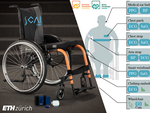
This hands-on work (internship or semester project) within a clinical setting will bring you close to intelligent health management while exploring multiple data systems. You will experience multimodal data of robotics rehabilitation, general clinical practice, and detailed clinical studies applied in classification and dimensionality reduction.
Keywords
Machine learning, time-series, HR, ECG, BP, wearables, nearables, Medical and health science, healthcare, Android studio, App development
Labels
Semester Project , Internship , Lab Practice , Bachelor Thesis , Master Thesis , Other specific labels , ETH Zurich (ETHZ)
Project Background
Your Task
Your Benefits
Your Profile
Contact Details
More information
Open this project... call_made
Published since: 2025-07-10 , Earliest start: 2025-09-01 , Latest end: 2026-06-30
Applications limited to ETH Zurich , EPFL - Ecole Polytechnique Fédérale de Lausanne , Empa , Eawag , Zurich University of the Arts , Zurich University of Applied Sciences , Wyss Translational Center Zurich , University of Zurich , University of St. Gallen , University of Lucerne , University of Lausanne , University of Geneva , University of Fribourg , University of Berne , University of Basel , Lucerne University of Applied Sciences and Arts , Institute for Research in Biomedicine , IBM Research Zurich Lab , Swiss Institute of Bioinformatics , CSEM - Centre Suisse d'Electronique et Microtechnique , Corporates Switzerland , CERN , Hochschulmedizin Zürich , Université de Neuchâtel , Università della Svizzera italiana , Swiss National Science Foundation , University of Konstanz , University of Hamburg , University of Erlangen-Nuremberg , University of Cologne , Universität zu Lübeck , Universität Ulm , Universität der Bundeswehr München , TU Dresden , TU Darmstadt , TU Berlin , Technische Universität Hamburg , Max Planck Society , Otto Von Guericke Universitat, Magdeburg , RWTH Aachen University , Ludwig Maximilians Universiy Munich , Humboldt-Universität zu Berlin , European Molecular Biology Laboratory (EMBL) , Eberhard Karls Universität Tübingen , Max Delbruck Center for Molecular Medicine (MDC) , Technische Universität München , Imperial College London , National Institute for Medical Research , Royal College of Art , UCL - University College London , University of Aberdeen , University of Cambridge , University of Manchester , University of Nottingham , University of Oxford , University of Leeds , Delft University of Technology , Maastricht Science Programme , Radboud University Nijmegen , Utrecht University
Organization Sensory-Motor Systems Lab
Hosts Paez Diego, Dr. , Paez Diego, Dr. , Paez Diego, Dr.
Topics Medical and Health Sciences , Information, Computing and Communication Sciences , Engineering and Technology
Continuous-Time Multi-Sensor Odometry in the Wild

This project provides the opportunity for an academic exchange with the Vision for Robotics Lab (V4RL) at the University of Cyprus (UCY). Led by Prof. Margarita Chli, the lab has recently won a prestigious ERC grant for the “SkEyes” project, to advance robotic perception for drone swarms and bridging our research activities between ETH Zurich and the University of Cyprus. This master project is offered as part of this research effort.
Keywords
Continuous-Time Odometry, Sensor Fusion
Labels
Semester Project , Master Thesis
Description
Work Packages
Requirements
Contact Details
More information
Open this project... call_made
Published since: 2025-07-09 , Earliest start: 2025-07-01 , Latest end: 2026-03-31
Applications limited to ETH Zurich
Organization Autonomous Systems Lab
Hosts Mascaro Rubén
Topics Information, Computing and Communication Sciences
Perceptive Bipedal‑Wheeled Locomotion Using Direct Depth‑Camera Inputs

Recent work [1] trains perceptive quadrupedal locomotion policies directly from depth images using teacher‑student distillation and RL fine‑tuning, achieving robust traversal over challenging terrain. The egocentric vision problem usually requires RL fine-tuning or more complex training schemes to enable active perception due to the information gap between teacher and student observations. This project aims to bring depth camera-based perceptive locomotion policies to a wheeled-bipedal robot. We believe that this might be more adequate than elevation map-based perception, due to the highly dynamic nature of its locomotion. We put high emphasis on novel training schemes to reduce the number of training phases. Initial inspiration could be drawn from [2]. References: [1]: https://arxiv.org/abs/2505.11164 [2]: https://arxiv.org/abs/2412.09149
Keywords
Perceptive locomotion · Depth camera · Bipedal‑wheeled Robot · End‑to‑end RL · Sim‑to‑real
Labels
Semester Project , Bachelor Thesis , Master Thesis
Description
Work Packages
Requirements
Contact Details
More information
Open this project... call_made
Published since: 2025-07-09
Organization Robotic Systems Lab
Hosts Schwarke Clemens , Klemm Victor
Topics Information, Computing and Communication Sciences , Engineering and Technology
Artificial intelligence for anxiety level classification using data from wearable devices

The aim of this project is to study the feasibility of using wearable devices for anxiety detection using machine learning models. By creating a robust framework for continuous monitoring and early assessment, it has the potential to meaningfully impact the users wellbeing.
Keywords
wearable technology, anxiety monitoring, health tracking, machine learning, artificial intelligence
Labels
Semester Project , Internship , Master Thesis
Description
Goal
Contact Details
More information
Open this project... call_made
Published since: 2025-07-09 , Earliest start: 2025-08-01 , Latest end: 2026-06-01
Organization Biomedical and Mobile Health Technology Lab
Hosts Otesteanu Corin, Dr
Topics Medical and Health Sciences , Information, Computing and Communication Sciences , Engineering and Technology
Machine learning for Motion Estimation and Fatigue Monitoring Using Triboelectric Nanogenerators

This project explores the feasibility of using triboelectric nanogenerators (TENGs) for joint angle analysis and fatigue monitoring during repetitive human movements using machine learning and deep learning.
Keywords
machine learning, artificial intelligence, generative AI, triboelectric nanogenerator, joint angle estimation, motion analysis, fatigue detection
Labels
Semester Project , Internship , Master Thesis
Description
Goal
Contact Details
More information
Open this project... call_made
Published since: 2025-07-09 , Earliest start: 2025-09-01 , Latest end: 2026-08-01
Organization Biomedical and Mobile Health Technology Lab
Hosts Otesteanu Corin, Dr
Topics Medical and Health Sciences , Information, Computing and Communication Sciences , Engineering and Technology
Learning Continuous-Time Feedback Laws for Hierarchical Reinforcement Learning

Hierarchical reinforcement learning (HRL) typically operates by decomposing tasks into high-level planners and low-level controllers. While high-level policies often evolve at discrete timescales, the low-level controller must generate fast, robust behaviors. This is usually framed as feedback laws or motion trajectories. In this project, we propose to learn continuous-time dynamical systems in the form of ODEs as low-level feedback controllers. The idea is to learn an ordinary differential equation (ODE) whose integral curve realizes the low-level trajectory, or whose vector field provides feedback behavior. These models offer several advantages: they are interpretable, temporally coherent, and can generalize better under time perturbations. The student will implement and evaluate ODE-based controllers within a hierarchical RL setup and compare their performance against standard low-level policy architectures (e.g., feedforward MLPs, recurrent policies). We are also open to shape the projects in the context of operator learning. References as inspiration: https://arxiv.org/pdf/1806.07366 https://arxiv.org/pdf/1909.12077 https://arxiv.org/pdf/2006.04439 https://arxiv.org/pdf/2402.15715
Keywords
Reinforcement Learning, Neural ODEs, Feedback Control, Hierarchical Policies, Continuous-Time Policies, Operator Learning
Labels
Semester Project , Bachelor Thesis , Master Thesis
Description
Work Packages
Requirements
Contact Details
More information
Open this project... call_made
Published since: 2025-07-07
Organization Robotic Systems Lab
Hosts Klemm Victor
Topics Mathematical Sciences , Information, Computing and Communication Sciences , Engineering and Technology
Automatic Failure Detection for Drones
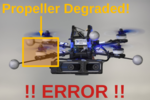
Automatic failure detection is an essential topic for aerial robots as small failures can already lead to catastrophic crashes. Classical methods in fault detection typically use a system model as a reference and check that the observed system dynamics are within a certain error margin. In this project, we want to explore sequence modeling as an alternative approach that feeds all available sensor data into a neural network. The network will be pre-trained on simulation data and finetuned on real-world flight data. Such a machine learning-based approach has significant potential because neural networks are very good at picking up patterns in the data that are hidden/invisible to hand-crafted detection algorithms.
Labels
Semester Project , Master Thesis
Description
Goal
Contact Details
More information
Open this project... call_made
Published since: 2025-07-07 , Earliest start: 2025-02-01 , Latest end: 2026-01-31
Organization Robotics and Perception
Hosts Bauersfeld Leonard
Topics Engineering and Technology
Rigid Body Dynamics as Sum of Squares: Reformulation and Investigation with Optimality Certificates

Rigid-body dynamics are foundational to robotics and mechanical systems. Surprisingly, although their equations often contain trigonometric or rational terms, they can typically be reformulated as (rational) polynomial systems. This opens the door to a powerful toolset: Sum-of-Squares (SOS) optimization. In this project, the student will explore how to reformulate the equations of rigid-body systems into polynomial forms suitable for SOS-based analysis (or its dual, the moment hierarchy). Through this lens, many classic robotics problems, such as verifying the global stability of visuomotor controller [1] or certifying optimality of solutions [2], can be recast as (convex) optimization problems. This project will investigate how far these methods scale: Can we extend them to complex robots? Can we prove properties like exponential stability or generate globally valid Lyapunov functions for general mechanical systems? Can we extract optimality certificates for complex dynamic trajectories? The student will implement tools for converting rigid-body models (e.g., simple pendulums, planar robots) into their polynomial equivalents, and then apply SOS programming and S-procedure techniques to verify Lyapunov stability or derive optimal controllers. References: [1] G. Chou and R. Tedrake, “Synthesizing Stable Reduced-Order Visuomotor Policies for Nonlinear Systems via Sums-of-Squares Optimization,” in IEEE Conference on Decision and Control (CDC), 2023. doi: 10.48550/arXiv.2304.12405. [2] S. Teng, A. Jasour, R. Vasudevan, and M. Jadidi, “Convex Geometric Motion Planning on Lie Groups via Moment Relaxation,” in Robotics: Science and Systems XIX, 2023. doi: 10.15607/RSS.2023.XIX.058.
Keywords
Rigid-Body Dynamics, Polynomial Systems, SOS Optimization, Lyapunov Stability, Convex Programming
Labels
Semester Project , Bachelor Thesis , Master Thesis
Description
Work Packages
Requirements
Contact Details
More information
Open this project... call_made
Published since: 2025-07-07
Organization Robotic Systems Lab
Hosts Klemm Victor
Topics Mathematical Sciences , Information, Computing and Communication Sciences , Engineering and Technology
Versatile, Robust and Simulatable Multi-Robot SLAM

This project provides the opportunity for an academic exchange with the Vision for Robotics Lab (V4RL) at the University of Cyprus (UCY). Led by Prof. Margarita Chli, the lab has recently won a prestigious ERC grant for the “SkEyes” project, to advance robotic perception for drone swarms and bridging our research activities between ETH Zurich and the University of Cyprus. This master project is offered as part of this research effort.
Keywords
Multi-Robot SLAM
Labels
Semester Project , Master Thesis
Description
Work Packages
Requirements
Contact Details
More information
Open this project... call_made
Published since: 2025-07-07 , Earliest start: 2025-07-01 , Latest end: 2026-03-31
Applications limited to ETH Zurich
Organization Autonomous Systems Lab
Hosts Mascaro Rubén
Topics Information, Computing and Communication Sciences
Learning Robust Agile Flight via Adaptive Curriculum
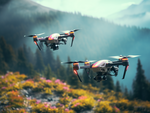
This project focuses on developing robust reinforcement learning controllers for agile drone navigation using adaptive curricula. Commonly, these controllers are trained with a static, pre-defined curriculum. The goal is to develop a dynamic, adaptive curriculum that evolves online based on the agents' performance to increase the robustness of the controllers.
Keywords
Reinforcement Learning, Drones
Labels
Semester Project , Master Thesis
Description
Goal
Contact Details
More information
Open this project... call_made
Published since: 2025-07-07 , Earliest start: 2023-11-01 , Latest end: 2024-12-31
Organization Robotics and Perception
Hosts Xing Jiaxu
Topics Engineering and Technology
Vision-based Navigation in Dynamic Environment via Reinforcement Learning
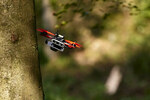
In this project, we are going to develop a vision-based reinforcement learning policy for drone navigation in dynamic environments. The policy should adapt to two potentially conflicting navigation objectives: maximizing the visibility of a visual object as a perceptual constraint and obstacle avoidance to ensure safe flight.
Keywords
Reinforcement Learning, Computer Vision, Drones
Labels
Master Thesis
Description
Goal
Contact Details
More information
Open this project... call_made
Published since: 2025-07-07 , Earliest start: 2023-11-01 , Latest end: 2024-12-31
Organization Robotics and Perception
Hosts Xing Jiaxu
Topics Engineering and Technology
Learning Rapid UAV Exploration with Foundation Models
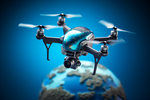
Recent research has demonstrated significant success in integrating foundational models with robotic systems. In this project, we aim to investigate how these foundational models can enhance the vision-based navigation of UAVs. The drone will utilize learned semantic relationships from extensive world-scale data to actively explore and navigate through unfamiliar environments. While previous research primarily focused on ground-based robots, our project seeks to explore the potential of integrating foundational models with aerial robots to enhance agility and flexibility.
Keywords
Visual Navigation, Foundation Models, Drones
Labels
Semester Project , Master Thesis
Description
Goal
Contact Details
More information
Open this project... call_made
Published since: 2025-07-07 , Earliest start: 2024-01-25 , Latest end: 2024-12-31
Organization Robotics and Perception
Hosts Xing Jiaxu
Topics Engineering and Technology
Energy-Efficient Path Planning for Autonomous Quadrotors in Inspection Tasks

Autonomous quadrotors are increasingly used in inspection tasks, where flight time is often limited by battery capacity. his project aims to explore and evaluate state-of-the-art path planning approaches that incorporate energy efficiency into trajectory optimization.
Keywords
Path Planning, Quadrotors
Labels
Semester Project , Master Thesis
Description
Goal
Contact Details
More information
Open this project... call_made
Published since: 2025-07-07 , Earliest start: 2024-11-11 , Latest end: 2025-08-13
Organization Robotics and Perception
Hosts Bauersfeld Leonard
Topics Engineering and Technology
Master Thesis: Vibro-tactile feedback in ventricle puncturing during External Ventricular Drain (EVD) procedure

EVD is a common procedure in Neurosurgery, nevertheless its placement is non-ideal in up to 40% of the cases because of lack of hands-on experience of residents. To try and solve the issue we propose a medical simulator that will merge haptic feedback with hardware components. Vibro-tactile feedback has been proven useful in medical simulations and could give a more complete and realistic experience to the training surgeon, either as supplementary information to the force feedback or as stand alone information. In order to feed back the vibro-tactile information to the user, the haptic device has to be instrumentalized with appropriate custom-made hardware.
Keywords
Vibro-tactile feedback, Haptic feedback, Medical robotics, Surgical simulators
Labels
Master Thesis
Description
Goal
Contact Details
More information
Open this project... call_made
Published since: 2025-07-07 , Earliest start: 2025-03-01
Organization Bio-Inspired RObots for MEDicine-Laboratory (BIROMED-Lab)
Hosts Gerig Nicolas, Dr. , Sommerhalder Michael , Ettori Sara Lisa Margherita
Topics Engineering and Technology
Master Thesis: Contact force evaluation of robotic endoscopic system based on Series Elastic Actuation
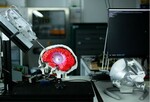
In the BIROMED-Lab we have been developing an endoscopic system for safer neurosurgeries with inspiration from human finger anatomy. Its two degrees of freedom allow the endoscope to investigate areas of the brain that would be inaccessible with standard rigid endoscopes. Thanks to springs in the transmission between the motors and the movable endoscope tip, the interaction forces between the instrument and the brain tissue can be reduced. Furthermore the interaction forces can be estimated by measuring the deflection of the spring. To make the telemanipulation of the endoscope safer and more intuitive for the surgeon, force feedback was also implemented.
Keywords
Robotic surgery, Neurosurgery, Telemanipulation, Haptic feedback, Robotic endoscope
Labels
Master Thesis
Description
Goal
Contact Details
More information
Open this project... call_made
Published since: 2025-07-07 , Earliest start: 2025-03-01
Organization Bio-Inspired RObots for MEDicine-Laboratory (BIROMED-Lab)
Hosts Ettori Sara Lisa Margherita , Gerig Nicolas, Dr. , Sommerhalder Michael
Topics Engineering and Technology
Event-based Particle Image Velocimetry
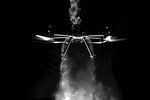
When drones are operated in industrial environments, they are often flown in close proximity to large structures, such as bridges, buildings or ballast tanks. In those applications, the interactions of the induced flow produced by the drone’s propellers with the surrounding structures are significant and pose challenges to the stability and control of the vehicle. A common methodology to measure the airflow is particle image velocimetry (PIV). Here, smoke and small particles suspended in the surrounding air are tracked to estimate the flow field. In this project, we aim to leverage the high temporal resolution of event cameras to perform smoke-PIV, overcoming the main limitation of frame-based cameras in PIV setups. Applicants should have a strong background in machine learning and programming with Python/C++. Experience in fluid mechanics is beneficial but not a hard requirement.
Labels
Semester Project , Master Thesis
Description
Goal
Contact Details
More information
Open this project... call_made
Published since: 2025-07-07 , Earliest start: 2024-07-01 , Latest end: 2025-03-01
Organization Robotics and Perception
Hosts Bauersfeld Leonard
Topics Information, Computing and Communication Sciences , Engineering and Technology
Deep Reinforcement Learning to Control Microrobots in 3D Dynamic Flow Environments

Identifying effective control strategies for the automation of acoustic robotic systems is challenging in a microfluidic environment. This project focuses on reinforcement learning (RL) to control microrobots in chaotic microfluidic flow and vortices.
Keywords
Reinforcement learning, Artificial Intelligence, Ultrasound, Fluid control
Labels
Semester Project , Bachelor Thesis , Master Thesis
Description
Goal
Contact Details
More information
Open this project... call_made
Published since: 2025-07-05 , Earliest start: 2025-07-01 , Latest end: 2025-10-31
Organization Acoustic Robotics for Life Sciences and Healthcare (ARSL)
Hosts Medany Mahmoud
Topics Information, Computing and Communication Sciences , Engineering and Technology
Humanoid robot ladder climbing via learning from demonstrations

This thesis will employ learning from demonstration to enable a humanoid robot to climb ladders. The student will gain hands-on experience with cutting-edge machine learning, sim2real pipelines, and humanoid robot hardware.
Keywords
Humanoids, learning from demonstrations, imitation learning, reinforcement learning, simulation, legged robotics, control, robot, sim2real
Labels
Master Thesis
Description
Work Packages
Requirements
Contact Details
More information
Open this project... call_made
Published since: 2025-07-03 , Earliest start: 2025-07-21 , Latest end: 2026-05-01
Organization Robotic Systems Lab
Hosts Li Chenhao , Baines Robert , Hansson Alexander
Topics Information, Computing and Communication Sciences , Engineering and Technology
3D-Printed Hydrogel-Based Composites with Engineered Core–Shell Magnetoelectric Networks For Biomedical Applications.

Magnetoelectric materials are highly promising in biomedicine due to their unique ability to couple magnetic and electric fields. This coupling allows for remote and precise control of various biological processes. For instance, in drug delivery, magnetoelectric nanoparticles can be directed to specific locations within the body using an external magnetic field, followed by electrical stimulation to trigger the release of therapeutic agents. Their responsiveness and multifunctionality make magnetoelectrics a versatile tool in advancing non-invasive medical treatments and targeted therapies. In this project we aim to improve the core-shell architecture of the magnetoelectric nanoparticles (ME NPs). Afterwards, a reliable protocol to create a homogenous and colloidally stable inks (i.e. mixture of the ME NPs and a hydrogel) will be established. The ink formulation will be tested within the custom-made 3D printer. Finally, multifunctional composites will be fabricated and tested for the brain tissue stimulation.
Keywords
Nanoparticle, Iron Oxide, Barium Titanate, Surface engineering, Ink formulation, Additive Manufacturing, Digital Light Processing, Brain Tissue, Wireless Stimulation
Labels
Semester Project , Bachelor Thesis , Master Thesis , ETH Zurich (ETHZ)
PLEASE LOG IN TO SEE DESCRIPTION
More information
Open this project... call_made
Published since: 2025-07-02 , Earliest start: 2025-07-02 , Latest end: 2026-03-31
Applications limited to ETH Zurich
Organization Multiscale Robotics Lab
Hosts Pustovalov Vitaly
Topics Engineering and Technology , Chemistry , Biology
Deep Learning of Residual Physics For Soft Robot Simulation

Incorporating state-of-the-art deep learning approaches to augment conventional soft robotic simulations for a fast, accurate and useful simulation for real soft robots.
Keywords
Soft Robotics, Machine Learning, Physical Modeling, Simulation
Labels
Semester Project , Master Thesis
PLEASE LOG IN TO SEE DESCRIPTION
More information
Open this project... call_made
Published since: 2025-07-01 , Earliest start: 2025-03-01 , Latest end: 2026-03-01
Organization Soft Robotics Lab
Hosts Michelis Mike , Katzschmann Robert, Prof. Dr.
Topics Information, Computing and Communication Sciences , Engineering and Technology
Bridging Human-Readable and Robot-Perceived Maps: CAD-SLAM Alignment and Refinement

This thesis proposes an industrial collaboration with Sevensense Robotics on enabling robots to take advantage of existing building models for their localization and navigation, by aligning the output of the robot's visual SLAM map to CAD models. This will be an exciting opportunity to push the state of the art in research and also in practical applied demonstrations on real robots.
Labels
Master Thesis , ETH Zurich (ETHZ)
Description
Requirements
Contact Details
More information
Open this project... call_made
Published since: 2025-07-01
Organization Autonomous Systems Lab
Hosts Oleynikova Helen, Dr.
Topics Information, Computing and Communication Sciences , Engineering and Technology